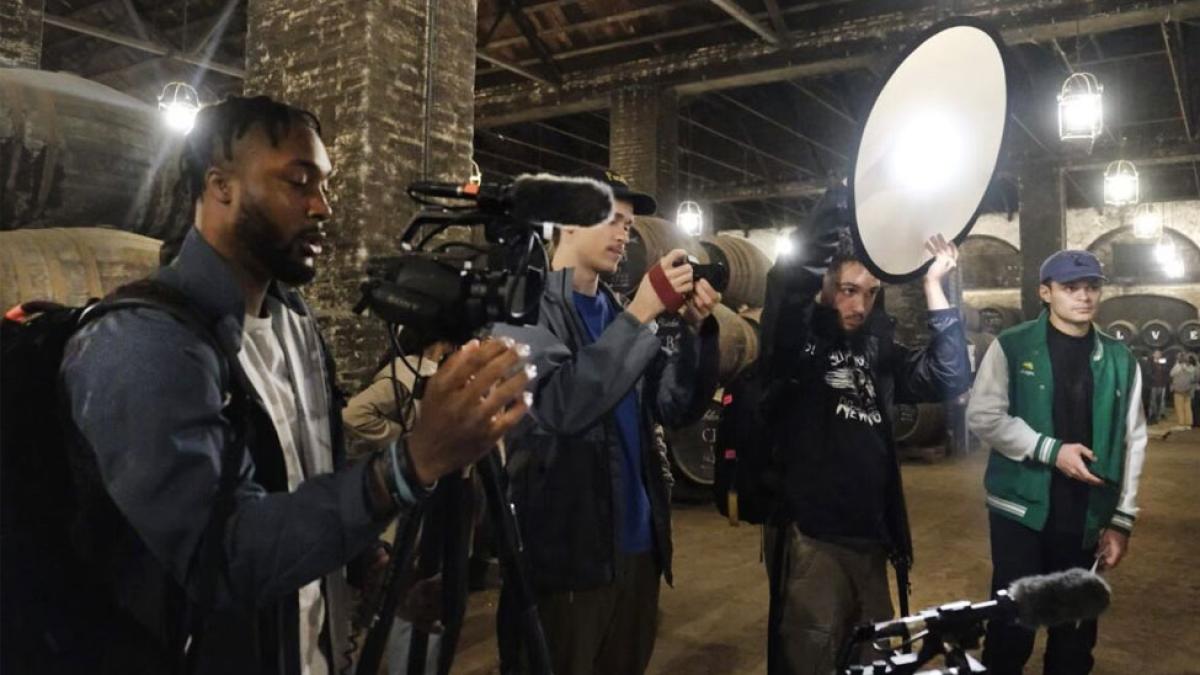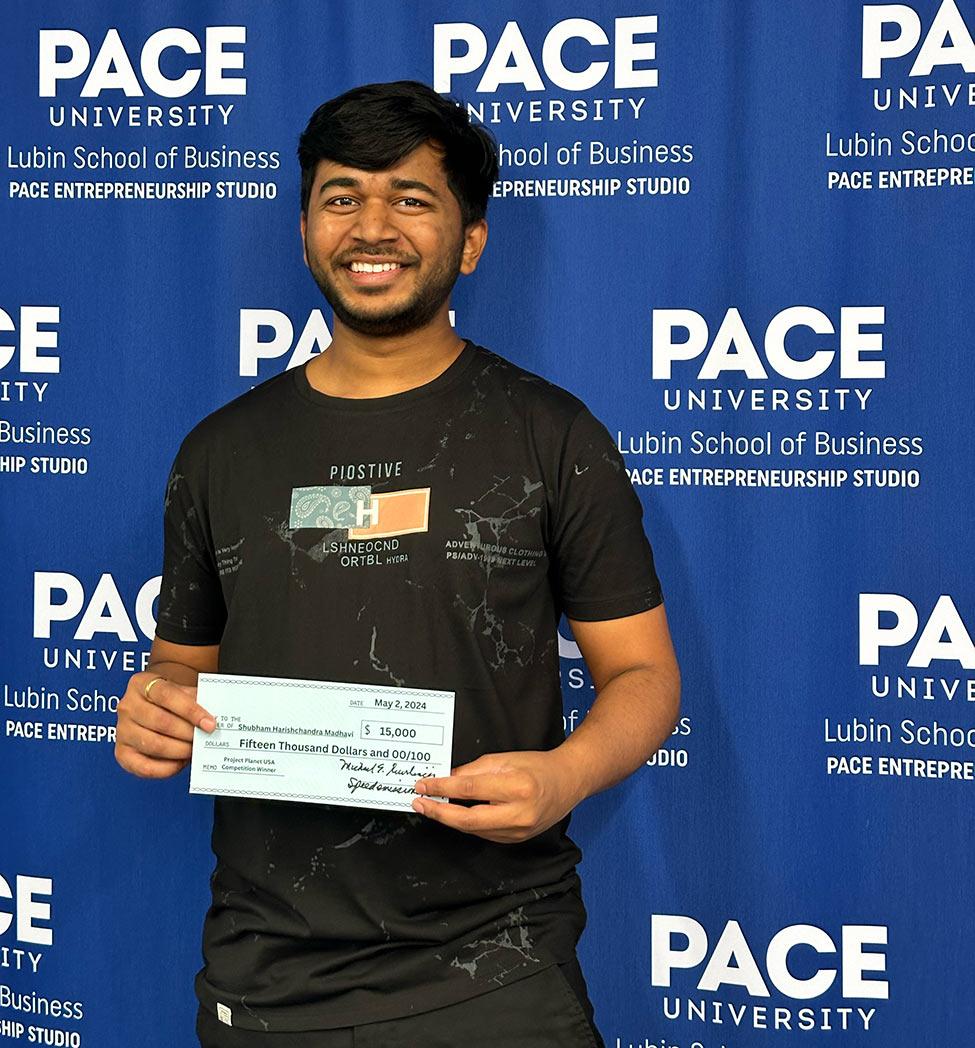
Renewing Oceans: The Bio-Brick Revolution
Seidenberg grad student Shubham Harishchandra Madhavi is making waves in the fight against climate change. His recent victory in the Project Planet USA contest, securing a $15,000 grant, has propelled his innovative concept into the spotlight.

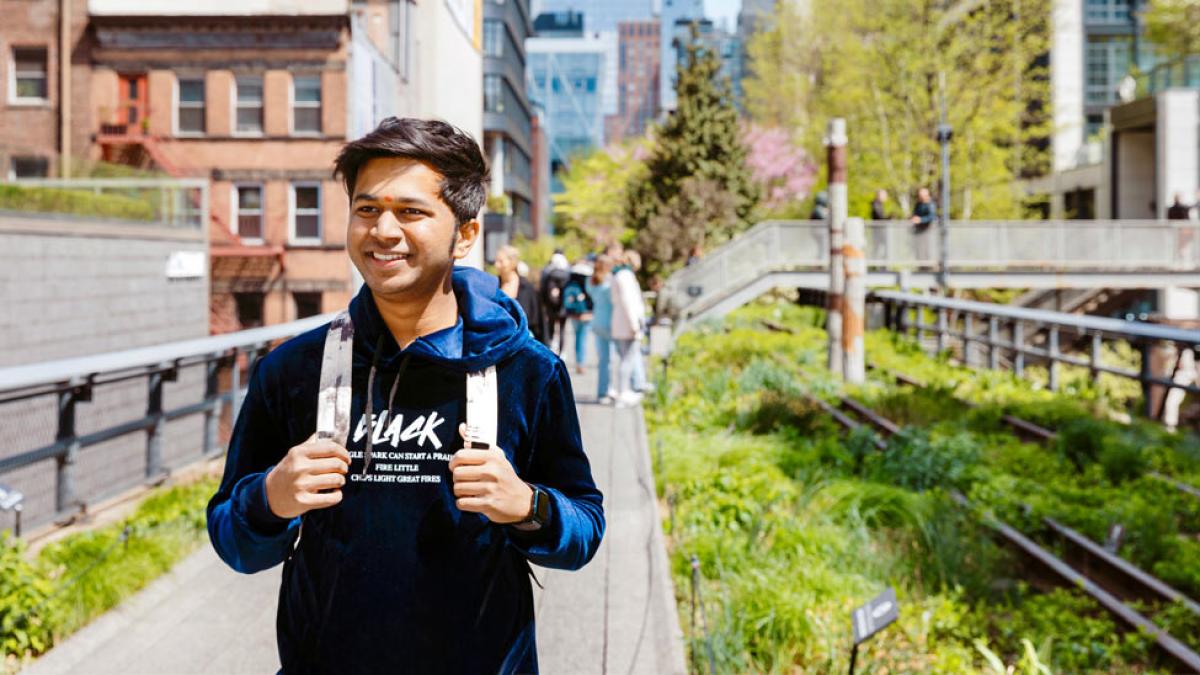
In the heart of New York City, amid the bustling streets and towering skyscrapers, Shubham Harishchandra Madhavi ‘24, a graduate student Pace’s Seidenberg School, is making waves in the fight against climate change. His recent victory in the Project Planet USA contest, securing a $15,000 grant, has propelled his innovative concept into the spotlight, igniting hope for a greener, more sustainable future.

Through Project Planet USA, an initiative spearheaded by Speedemissions and The Front Yard at Pace University, students and faculty were encouraged to submit their concepts, innovative ideas, or solutions aimed at addressing climate change for a chance to win a cash grant in the amount of $15,000, plus professional mentoring, public relations, and network connections.
So, what does it take to win?
Shubham's winning concept is as ingenious as it is ambitious: bio-bricks harvested from plastic that has made its way into the ocean. These special bio-bricks would be designed to restore coral reefs while combating the looming threat of climate change. “My winning concept revolves around the creation of bio-bricks harvested from ocean plastic, which have the remarkable ability to convert CO2 into coral-restoring nutrients," Shubham explains. “This innovative approach not only addresses the urgent need to tackle plastic pollution in our oceans but also contributes to the restoration of coral reefs, which are vital ecosystems threatened by climate change.”
With the support of the grant and accompanying mentoring, Shubham envisions tangible impacts rippling across oceans and coastlines worldwide. "By removing ocean plastic and converting it into bio-bricks, we directly mitigate the harmful effects of plastic pollution on marine life and ecosystems," he says. But his vision extends far beyond mere mitigation. These bio-bricks, infused with the power to convert CO2 into coral-restoring nutrients, hold the potential to reshape entire ecosystems, bolstering biodiversity and fortifying coastal communities against the ravages of climate change.
“This innovative approach not only addresses the urgent need to tackle plastic pollution in our oceans but also contributes to the restoration of coral reefs, which are vital ecosystems threatened by climate change.”
The grant's resources offer Shubham a network of support—including mentorship—in his quest to bring his proposed idea into fruition. Professional mentoring promises guidance in navigating the turbulent waters of project management, while public relations support amplifies his message, rallying support from partners and funders alike. Network connections pave the way for collaborations, opening doors to a world of opportunities previously beyond reach. "Leveraging the grant's resources is crucial for enhancing the impact and reach of my project," Shubham asserts.
But Shubham's ambitions extend far beyond the confines of the grant period. His long-term goals are as vast as the ocean itself, encompassing the scaling up of bio-brick production, the expansion of the project to distant shores, and the integration of his innovation into existing reef restoration efforts. "Establishing partnerships with local communities, businesses, and governments" is key to sustaining impact, he emphasizes.
As Shubham charts a course towards a greener tomorrow, his journey serves as a beacon of hope in a world besieged by environmental crises. Through unwavering determination and boundless innovation, he proves that even the mightiest challenges can be overcome, one bio-brick at a time.
More from Pace
Anthony Moretto ’24 will graduate from Pace as the Pleasantville Campus 2024 Trustee Award Winner; an honor he earned by leveraging his academic talents into tangible impact for the Pace student community.
On Friday, April 26, students from Pace University's Seidenberg School of Computer Science and Information Systems experienced a day of inspiration and innovation at Google's New York City office.
Om Gaikhe (MS in Data Science ’24) is a committed senior at Pace University's Seidenberg School of Computer Science and Information Systems. Om blends rigorous academics with active campus engagement, delving deep into software development and innovative technologies.
Always Striving for More
Anthony Moretto ’24 will graduate from Pace as the Pleasantville Campus 2024 Trustee Award Winner; an honor he earned by leveraging his academic talents into tangible impact for the Pace student community.
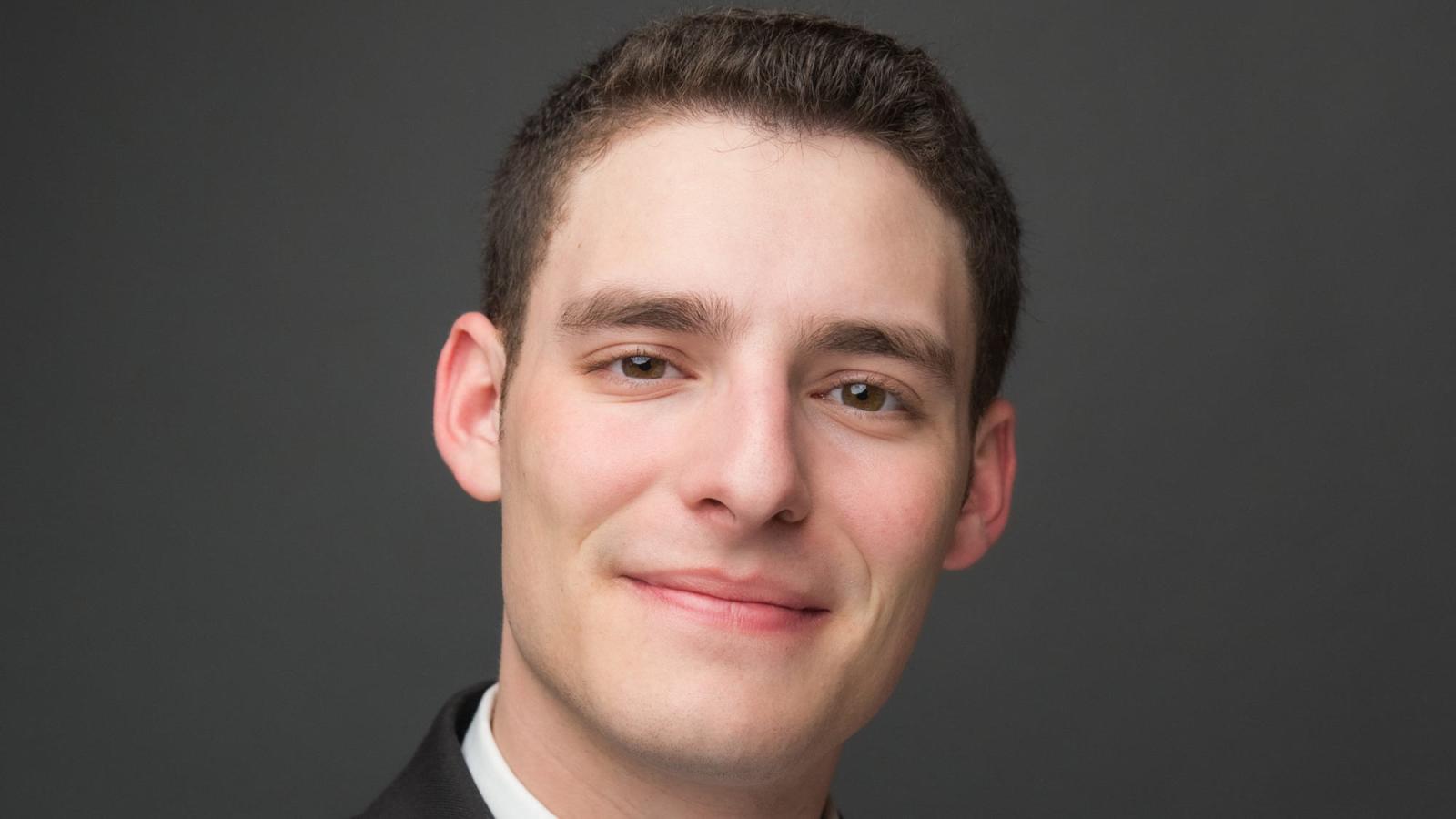
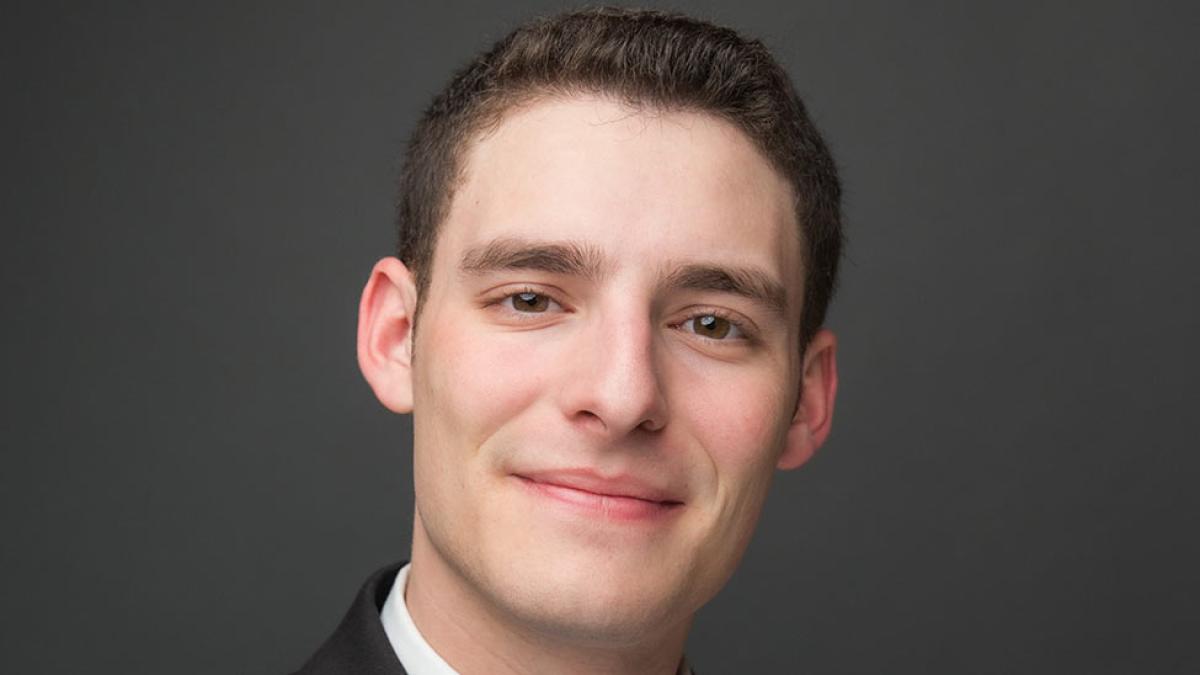
In a few short weeks, Pforzheimer Honors College student Anthony Moretto will graduate from Pace University with no shortage of accomplishments.
In the classroom, Anthony has been exemplary—he’s posted a near-perfect 3.96 cumulative GPA, earning a bachelor’s degree in finance at Lubin. Yet, it’s been his uncanny ability to combine his academic interests with becoming an on-campus leader in Pleasantville that has captured the attention of his peers and professors, enabling to earn the highly coveted 2024 Trustee Award.
“I attribute my drive to pure love of everything I do here,” says Anthony. “I have taken my e-board positions and jobs as a privilege. Being able to take classes in the university setting and learn on a higher level is also a great privilege.”
“I have taken my e-board positions and jobs as a privilege. Being able to take classes in the university setting and learn on a higher level is also a great privilege.”
One of the roles he’s most known for is the General Manager of Pace Perk Mart, the ever-popular convenience store at the heart of the Pleasantville Campus. Having initially served as the assistant finance manager tasked with cash and dining dollar accounting, Anthony worked his way up to the GM position, through which he has led a group of roughly a dozen student employees in all facets of business, from day-to-day operations to building a great company culture. Pace Perk is part of Pace’s Center of Student Enterprise, through which students can gain crucial experience managing student-operated businesses. By partaking in this unique experiential learning opportunity, Moretto will be graduating one-step ahead of the competition, all while admirably serving the Pace Community.
He’s also been an instrumental to the increasing popularity of the Pace Pleasantville Investment Club; over the course of his time at Pace, Anthony has helped grow the club and strengthen its operations by instituting budgetary and management systems that have helped it become a major presence on campus. As President, he created numerous investment presentations, coordinated with major financial institutions such as JPMorgan and Barclays to organize events, and much more. He also served as the treasure of the Pace University Programming Board, managing a budget of $55,000 per semester.
“There are a few events and achievements that I am very proud of here,” recalls Anthony. “Helping to successfully plan the Springfest carnival two years in a row is definitely up there. I had an event where I had Barclays come speak to investment club with around 40 attendees, which was one of my proudest events. Turning great profits at Pace Mart and nurturing a large team as general manager is also a great point of pride.”
While Anthony’s individual accomplishments are impressive, he credits his strong support system—both from his family as well as his friends and colleagues at Pace—as crucial in helping him develop the work ethic that has enabled him to thrive as a Setter.
“I believe a lot of my drive comes from the way I was raised. My father’s motto is ‘I did it yesterday’ and I try to match that enthusiasm and work ethic. The love and support I have been given by family and friends also pushes me to strive for greatness. My grandparents didn’t uproot from Italy and come to America for me to shoot for mediocrity.”
Anthony is excited to continue to push boundaries in the future, as he pursues a career in the financial word; he’s currently weighing where exactly in the investment field he’d like to most make an impact, which will dictate his next steps in terms of certifications and licensing. Having recently presented his Honors Thesis that centered around using CRSP returns data and Bloomberg ESG data for the companies of the S&P 500 to determine the relationship between ESG disclosures and returns, he’s set himself up well to dive into some of the industry’s most pertinent and future-forward issues.
While Anthony will be moving on to professional pursuits instead of returning to Pace this coming fall, his influence will remain strong on the Pleasantville Campus as he passes the baton to the next generation of Setters ready to make an impact.
“Loving what I do here and how it positively impacts the people around me gave me the drive to do the things I did,” concludes Anthony. “My advice for new students is to get involved, but not to over-extend yourselves. Get the most out of your college experience, make friends, go to events, and strive for greatness.”
See More from Pace:
Dyson economics student and Fed Challenge team co-captain Liam Chentoufi ’25, pictured alongside the team and Federal Reserve chair Jerome Powell, is harnessing the power of AI to help better predict Federal Reserve monetary policy decisions through an exploratory research study leveraging machine learning.
Seidenberg grad student Shubham Harishchandra Madhavi is making waves in the fight against climate change. His recent victory in the Project Planet USA contest, securing a $15,000 grant, has propelled his innovative concept into the spotlight.
From immersive research to on-the-ground experiences with coopers in Spain, the PaceDocs team is once again crafting a captivating narrative. With dedicated translation efforts, meticulous scriptwriting, and seamless editing, the team navigates challenges to produce a stellar final product which will premiere on May 2.
Seidenberg Students Explore Innovation at Google NYC
On Friday, April 26, students from Pace University's Seidenberg School of Computer Science and Information Systems experienced a day of inspiration and innovation at Google's New York City office.
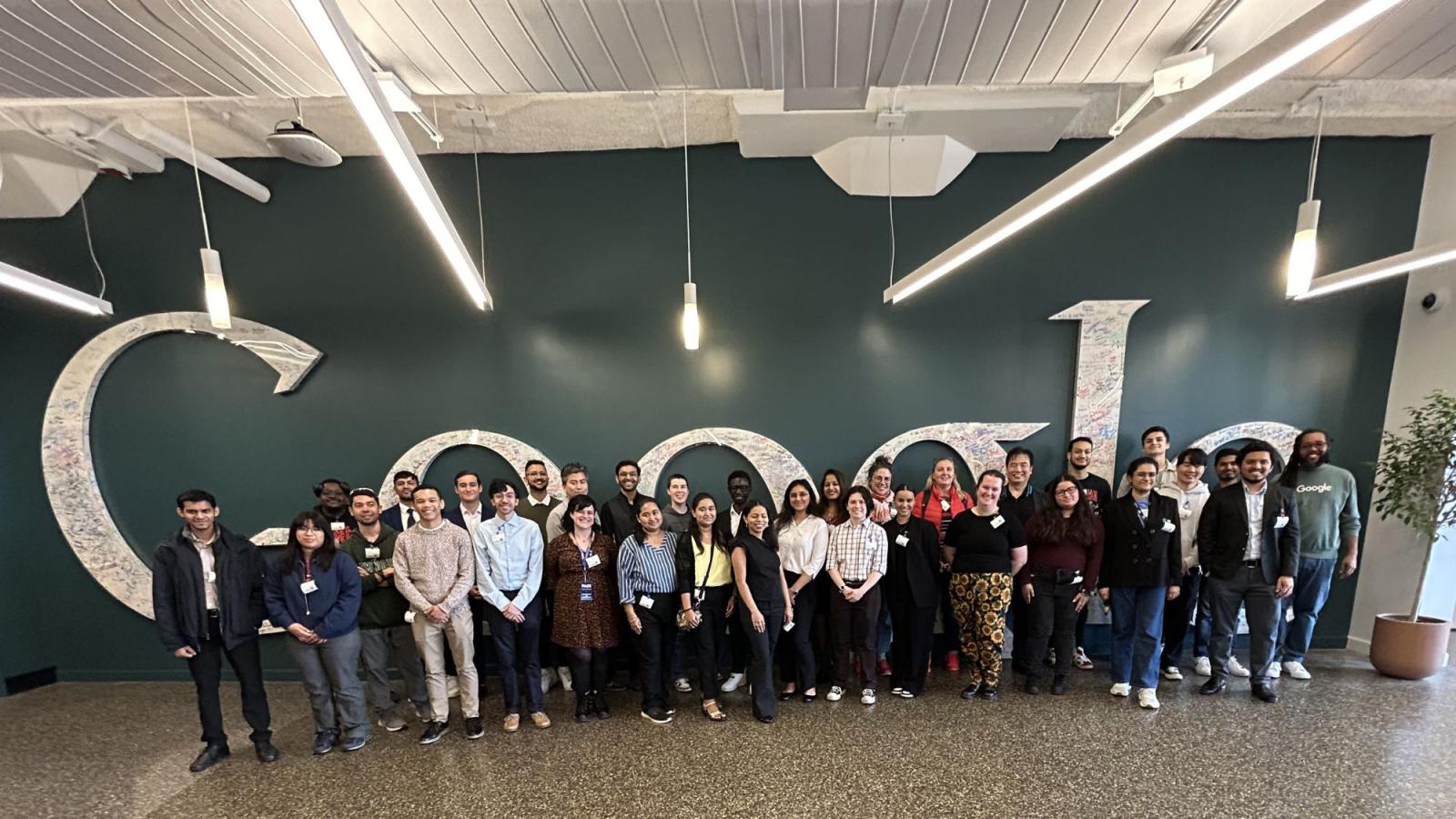
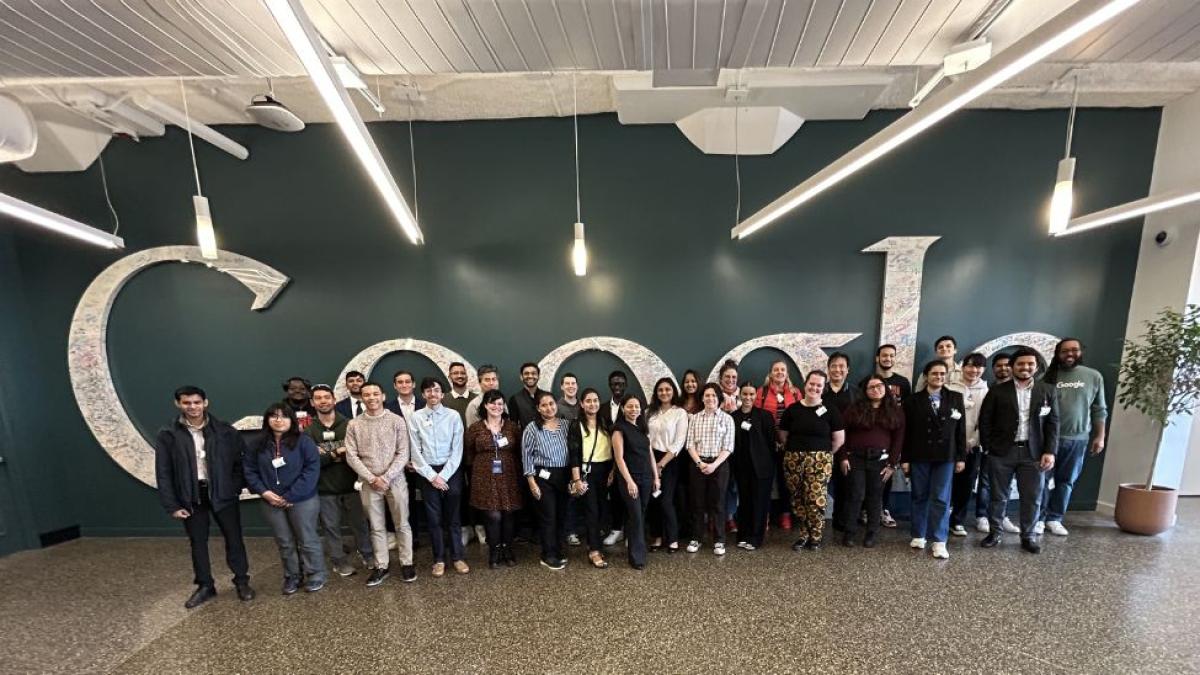
On Friday, April 26, students from Pace University's Seidenberg School of Computer Science and Information Systems experienced a day of inspiration and innovation at Google's New York City office. The visit, which featured a series of lightning talks, a facility tour, and extensive networking opportunities, was part of the school’s commitment to experiential learning, and Pace’s priority of enhancing educational experiences through real-world exposure.
The day was hosted by Tequila Lamar, an advocate for Education for Social Impact, who facilitated the engaging sessions that offered students firsthand insights into the tech industry. Highlight speakers included Vahid G., who shared his intriguing journey into technology and artificial intelligence, and Frankie Lamar, who discussed his path from a diverse background to finding success in the tech industry, and Toby Kovacs, who illustrated how a passion for sales can lead to substantial career achievements.
Students were especially excited to interact with professionals working in what many consider their dream job environment. "Being with students as they explored one of their absolute dream offices was a gift. As they get to interact and dream big about their futures, I absolutely get to do the same," reflected Katie Todd, Seidenberg’s Assistant Dean of Strategy and Engagement and the co-director of the school’s newly founded AI Lab.
The event was not only a chance for students to glimpse the inner workings of a leading global tech company but also served as a bridge between academic theories and practical, impactful tech applications.
As Seidenberg continues to facilitate these transformative experiences, its students are increasingly equipped to enter the tech field not just as participants, but as innovators and leaders.
Chase Selected as Periclean Faculty Leader, Receives Grant for New Course
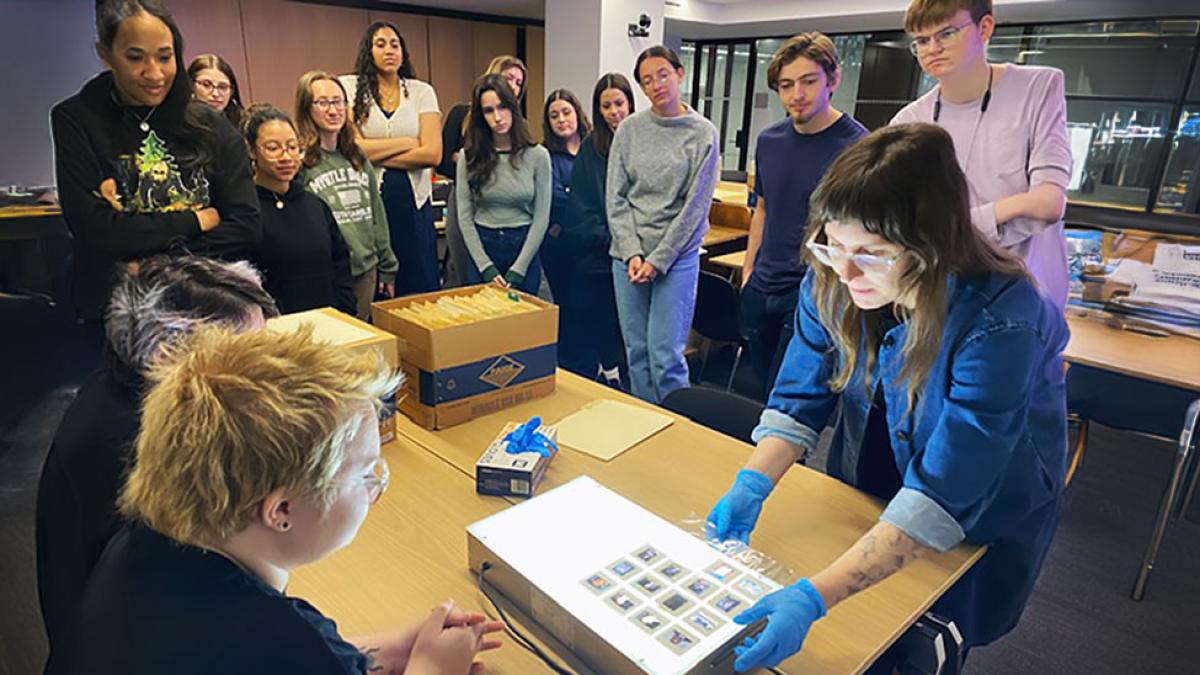
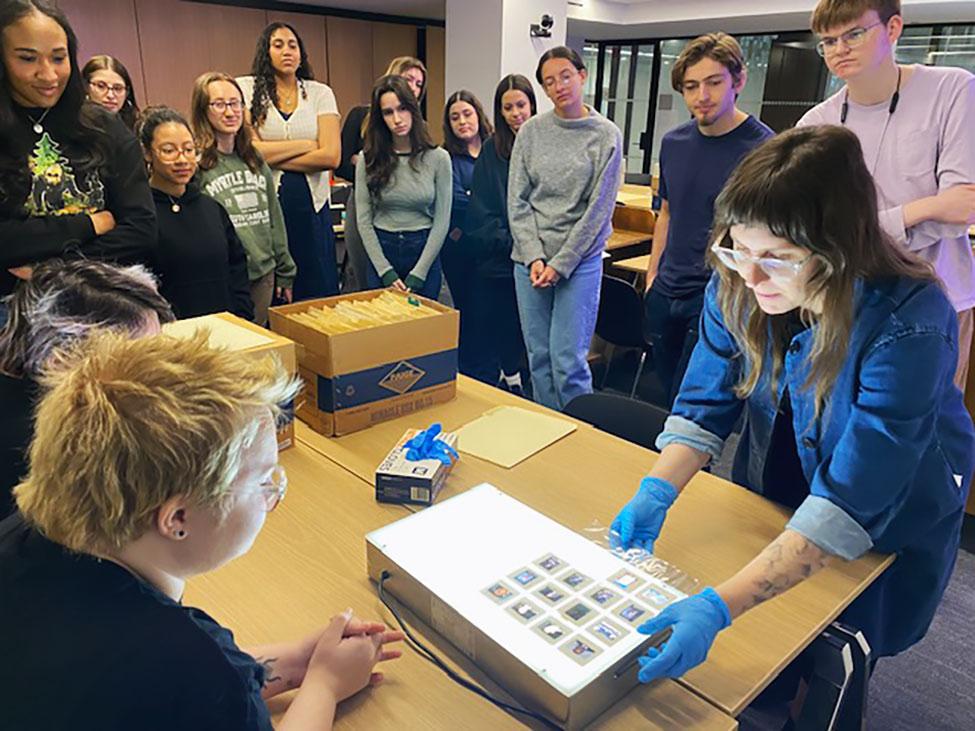
Associate Professor of History Michelle Chase, PhD, has been selected as a Periclean Faculty Leader by Project Pericles and has received a $4,500 grant from the organization to create a new humanities course that incorporates a community-initiated project.
Project Pericles is an organization that focuses on voter education and is a longtime partner of Pace University’s Center for Community Action and Research (CCAR) and the Pace Votes program. The course supported by the grant also must incorporate voter education through discussion of relevant civic issues.
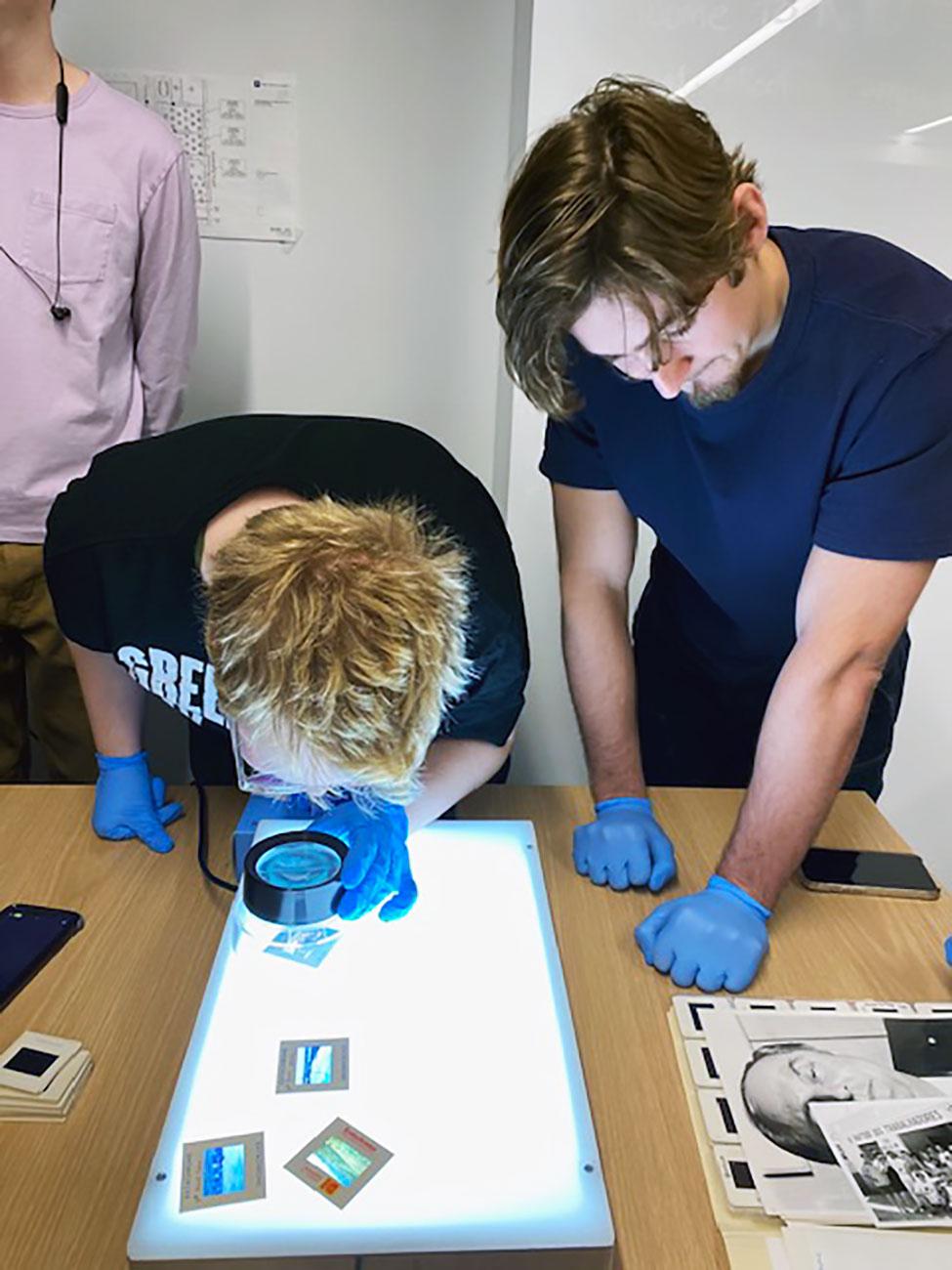
With the grant, Chase launched HIS 134: Modern Latin America this spring, a course that satisfies Pace’s civic engagement requirement. Through the course, Chase and her students are partnering with a local nonprofit, the North American Congress on Latin America (NACLA), an organization dedicated to advocating for social justice throughout the Americas, focusing specifically on Latin American migration to the United States, and U.S. foreign policy toward Latin America.
“I am thrilled about this grant because it gives my students an opportunity to explore in a hands-on way what it means to be an active historian and to contemplate ways that scholarship can intersect with community engagement,” said Chase.
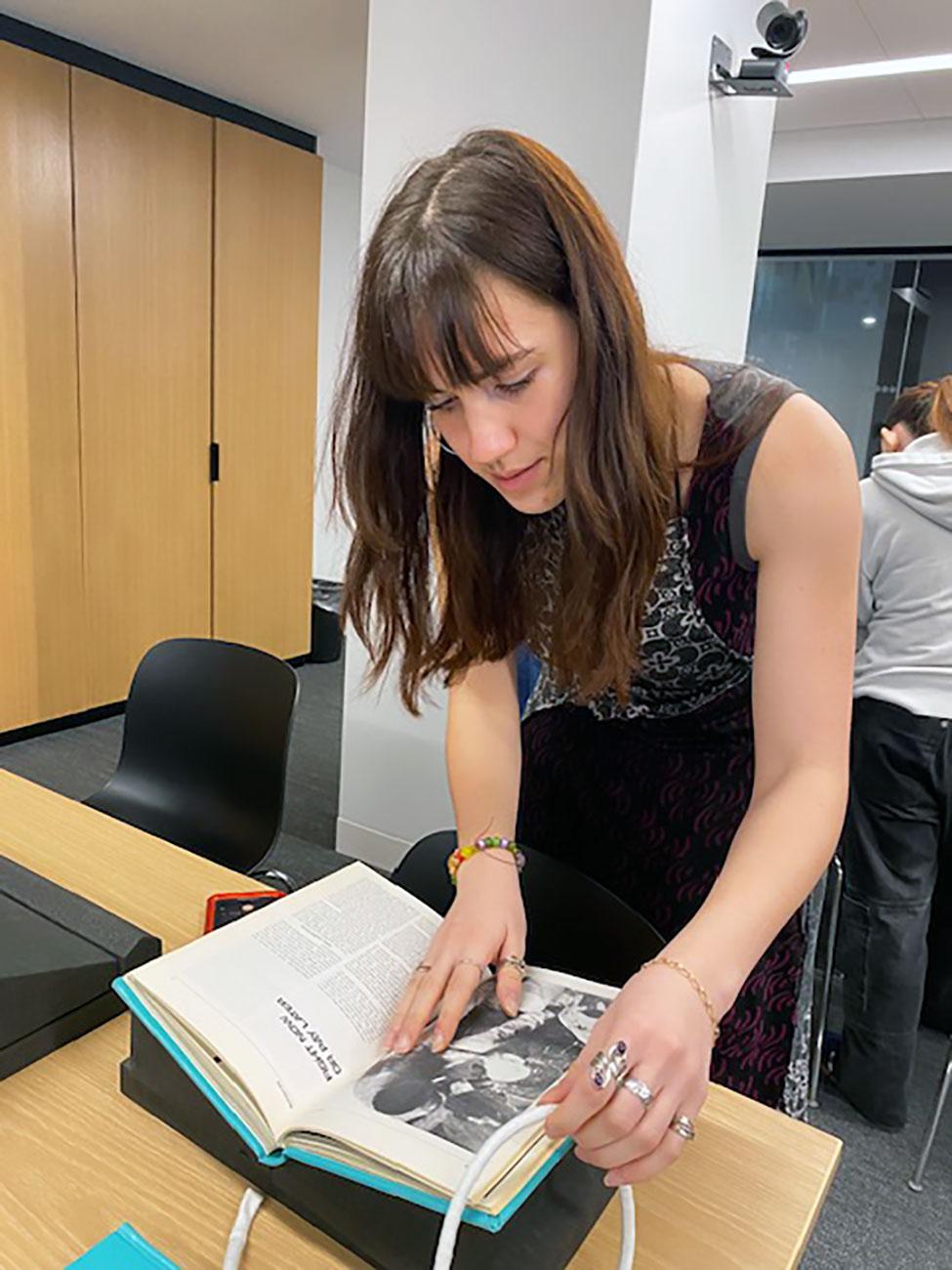
Students in the course combine the academic portion—studying recent history of Latin America—with civic engagement, exploring significant events in Latin America through NACLA’s archives. The archives, located in Washington Square, include photos of Fidel Castro speaking at a rally in Cuba, protests in Puerto Rico, agricultural projects in Mexico, and more.
“The entire class has been able to fully submerge ourselves into the NACLA’s work and try to live through what they were capturing,” said Ana Cristina Armstrong Matta ’26, History. “I’m from Puerto Rico so when I found a few archives that focused solely on my home, it was so special.”
The goal of the course is to curate an online exhibit for NACLA, with students carefully selecting photos to highlight significant events and photographic works.
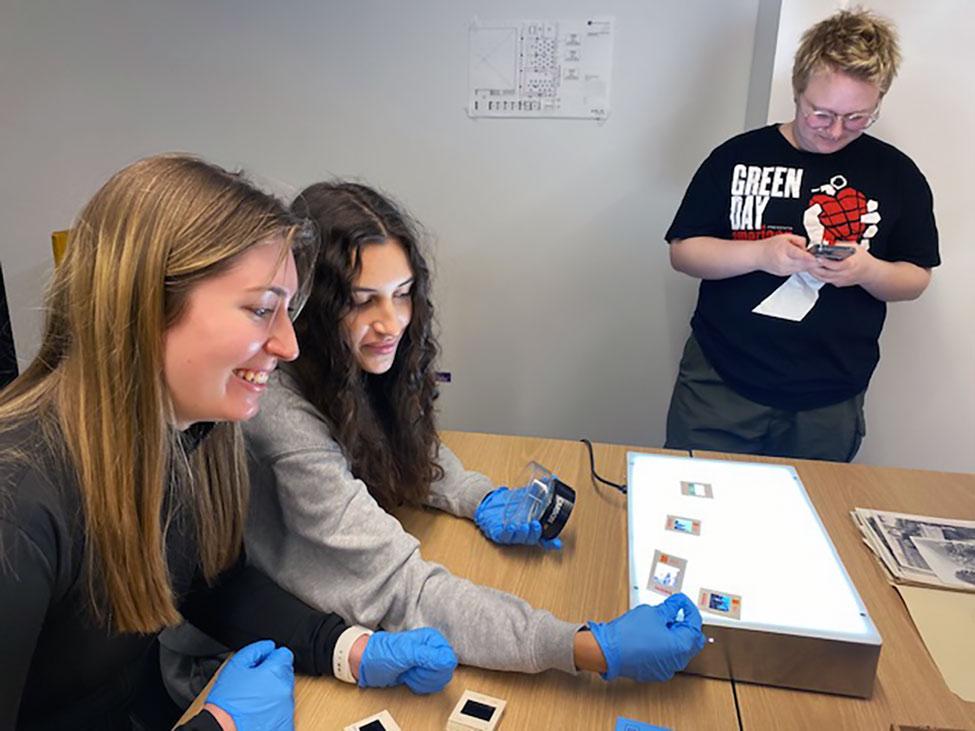
Chase and Armstrong Matta also presented on the course at an event hosted by CCAR entitled Leading with Civic Engagement: Faculty Info Session on Community-Engaged Work in Civic Engagement Courses on Friday, April 12.
“It is a very eye-opening course when looking at the actions of the U.S. towards Latin American,” said Armstrong Matta. “It’s a really great experience to not just have in class discussions, but to get to see the work and even contribute to NACLA’s mission.”
How The Constitution Fails To Protect The Environment
Haub Law Professor Katrina Kuh writes a piece in Nation of Change about how the Constitution fails to protect the environment.
"Beginning Of The End": Law Professor Says First Hush-Money Witness Set Up Case To "Bury Trump"
Professor Bennett Gershman speaks to Salon.com about ex-American Media Inc. David Pecker and Donald Trump’s relationship in the former president's New York hush-money trial.
Your Guide to Westchester County’s College Commencements
Westchester Magazine reports Pace University will hold its commencement ceremony on May 20 at the USTA Billie Jean King National Tennis Center in Queens.
Pace Students to Premiere Latest Documentary at Jacob Burns Film Center
Pace University’s documentary film team – PaceDocs – is set to premiere “The Cooper: Crafting the Soul of the Cask” at 7 p.m. this Thursday, May 2 at the Jacob Burns Film Center in Pleasantville.
Coding His Path: A Student's Quest for AI Mastery at Pace University
Om Gaikhe (MS in Data Science ’24) is a committed senior at Pace University's Seidenberg School of Computer Science and Information Systems. Om blends rigorous academics with active campus engagement, delving deep into software development and innovative technologies.
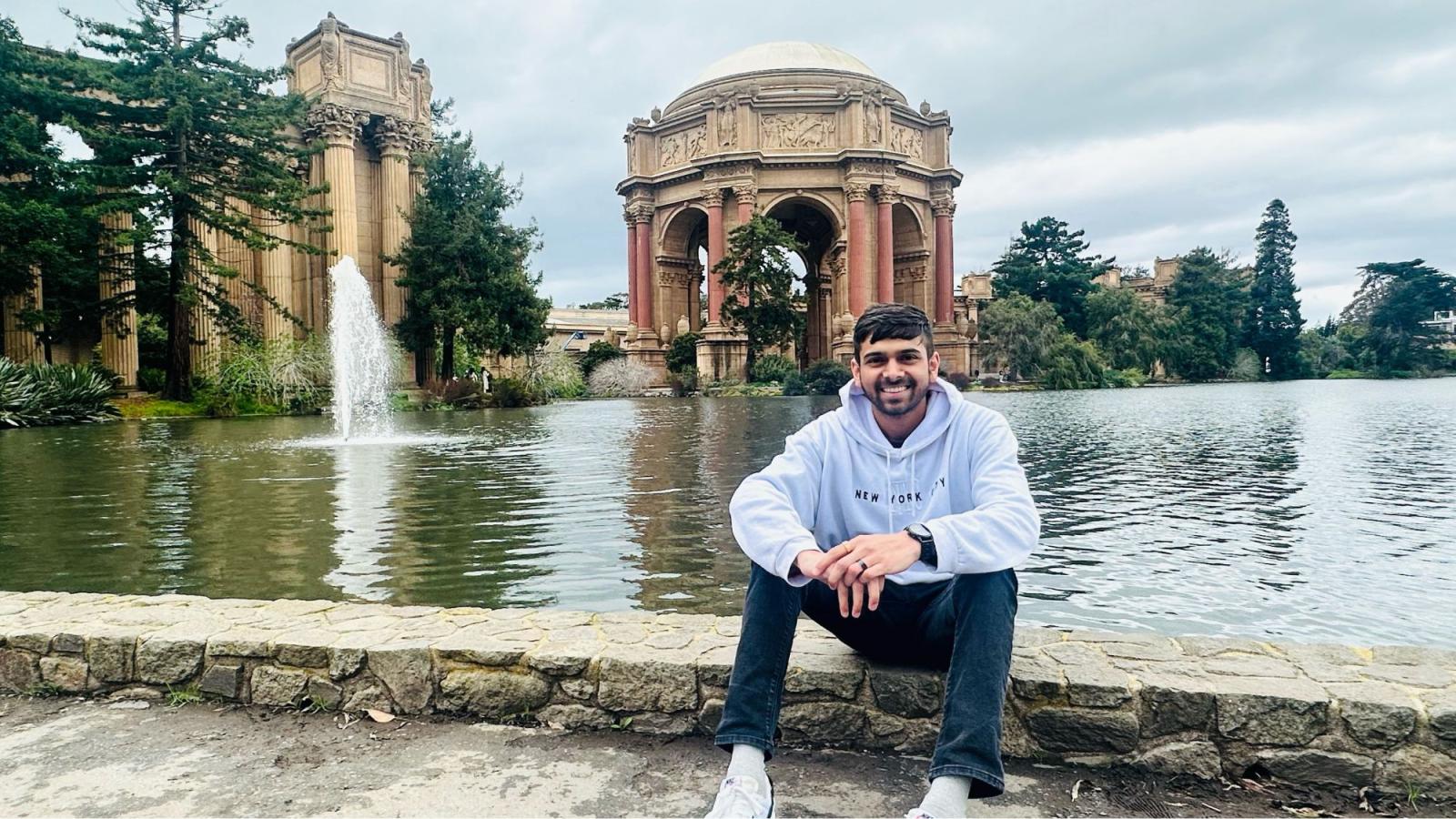
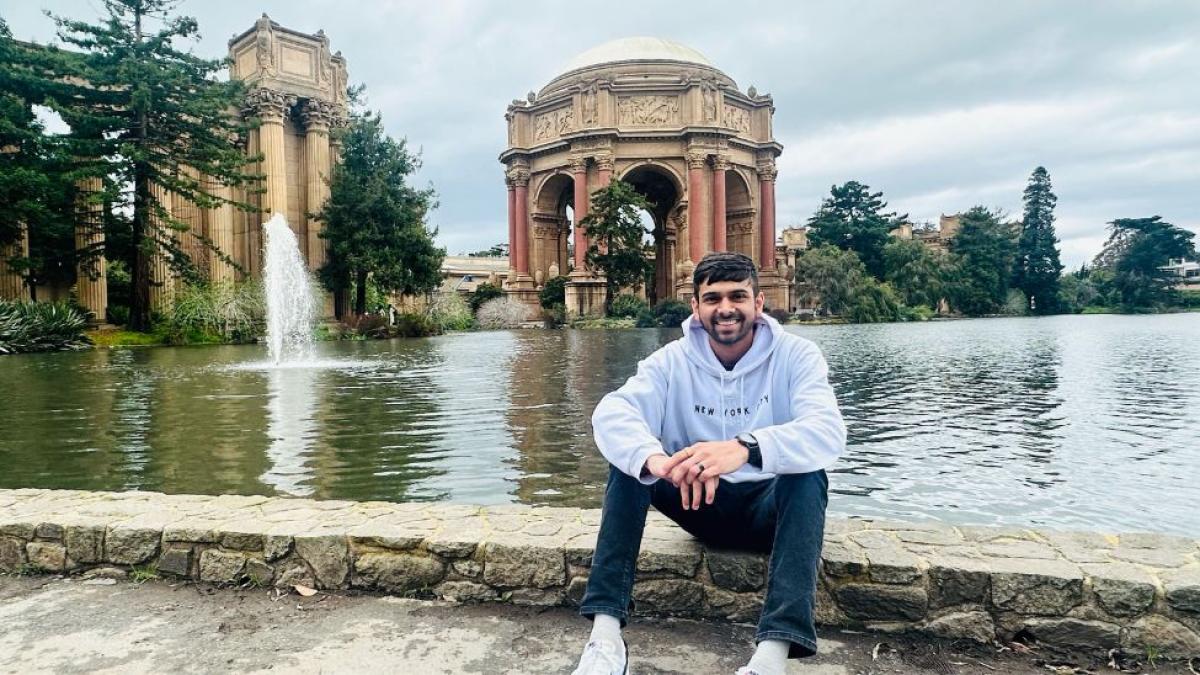
Om Gaikhe (MS in Data Science ’24) is a committed senior at Pace University's Seidenberg School of Computer Science and Information Systems. Om blends rigorous academics with active campus engagement, delving deep into software development and innovative technologies. His journey started with an early interest in programming and led him to specialization in artificial intelligence. As a student who is always participating in hackathons, contributing to research, and mentoring peers, Om embodies the collaborative, ambitious spirit of the Seidenberg community, aiming to make a significant impact in the tech industry.
What initially attracted you to Pace University, and how has the school lived up to your expectations?
Shortlisting the right universities for me to study away from home was a crucial step, especially coming from a business & finance background. Not only did I want to learn more about tech, but I also wanted to be able to apply the knowledge I had consumed before. What really attracted me to Seidenberg was the flexible electives that I could choose as I proceed with my education. Data Science has multiple applicability in the real world, but Seidenberg offered more concentrated electives around multiple fields including MBA, Finance, Marketing, Information systems & Economics. It suited just right with what I was seeking.
Can you describe a class or project at Pace that was particularly impactful for you? What made it stand out?
A class at Seidenberg that deeply impacted me was my capstone class, inspired by a paper I co-authored with Dr. Christelle Scharff and our team, titled “AI Strategies: National Strategies and Regulations.” This project, which won the Best Paper Award at the RII 2024 Research and Innovation Forum in Ravello, Italy, involved developing an AI-driven chatbot that used BERTopic and Llama 2 models to streamline literature reviews for machine learning projects. What stood out was not only the advanced technical skills I developed but also how the project transformed my approach to research. The chatbot, which handled a database of over 1.7 million machine learning publications, not only enhanced research efficiency but also inspired users by making vast amounts of information easily navigable. This capstone project was a major milestone in my academic career, showcasing how technology can revolutionize traditional academic practices and highlighting the transformative potential of intuitive AI in academic research.
How have your experiences outside the classroom, such as in clubs or sports, enhanced your education at Pace?
Representing Pace Esports team the Lapis Blus, was a splendid experience full of fun, teamwork, challenge, and healthy competition. It really helps me connect with people learning different tracks of careers. I made a few friends, we played, we won, we lost, overall, it was a good place to be in.
What has been your favorite moment or memory from your time at Pace so far?
One of my most memorable experiences at Pace occurred on an eventful day when New York City experienced a 4.8 magnitude earthquake. I was part of the organizing team for the Google Women Techmakers event, held in celebration of International Women’s Day at Seidenberg. Despite the unexpected shake-up, the event was a great success. Adding to the thrill of the day, I had the opportunity to take the stage and present a paper I co-authored, titled “Inclusion Ethics in AI: Use Cases in African Fashion”. It was both a scary and thrilling day, packed with learning and unique experiences. My friends & I always have a good laugh about that day!
What advice would you give to prospective students considering Pace University?
There will be a time when things may feel overwhelming and that’s okay. Ask for help; you will find that help will always be given to those who ask for it. My advice for any prospective student would be to remember that college/university is all about the process of learning and growth. It’s a process and you must be in love with it, so that one takes initiative to work on it. Be grateful for small victories along the way and trust that there are better times ahead if you stay on the course.
Can you share a story about a professor or staff member at Pace who has significantly influenced your academic journey?
My academic journey at Pace has been profoundly influenced by the mentorship of Dr. Kaleemunnisa and Dr. Christelle Scharff. Dr. Kaleema first recognized my potential during my initial year at Seidenberg. Her guidance was crucial; she encouraged me to seek help and introduced me to Dr. Scharff, who has been instrumental in my development. Under Dr. Scharff’s mentorship, I evolved as a research and graduate assistant, making significant contributions to the fields of AI and ML. Together, we co-authored the paper "AI Strategies: National Strategies and Regulations". Dr. Kaleemunnisa's encouragement to seek help when facing challenges and Dr. Scharff’s patient mentorship opened doors to numerous research opportunities and inspired me to embrace them fully. Their support has been invaluable in shaping my academic path.
How do you engage with the Pace community and the wider environment of New York City in your studies or extracurricular activities?
Volunteering! I think that’s been my go-to way to give back to the Seidenberg community. Helping me with gaining extra knowledge and wisdom from people across the world. I had the opportunity to volunteer at the Opportunities in Africa Summit, and it was an experience to remember. The perspectives I learned, life-stories I heard, and the networking goes a long way. Probably one of the best ways to attend conferences without breaking your wallet as a student!
Machine Learning, Student-Powered
Dyson economics student and Fed Challenge team co-captain Liam Chentoufi ’25, pictured alongside the team and Federal Reserve chair Jerome Powell, is harnessing the power of AI to help better predict Federal Reserve monetary policy decisions through an exploratory research study leveraging machine learning.
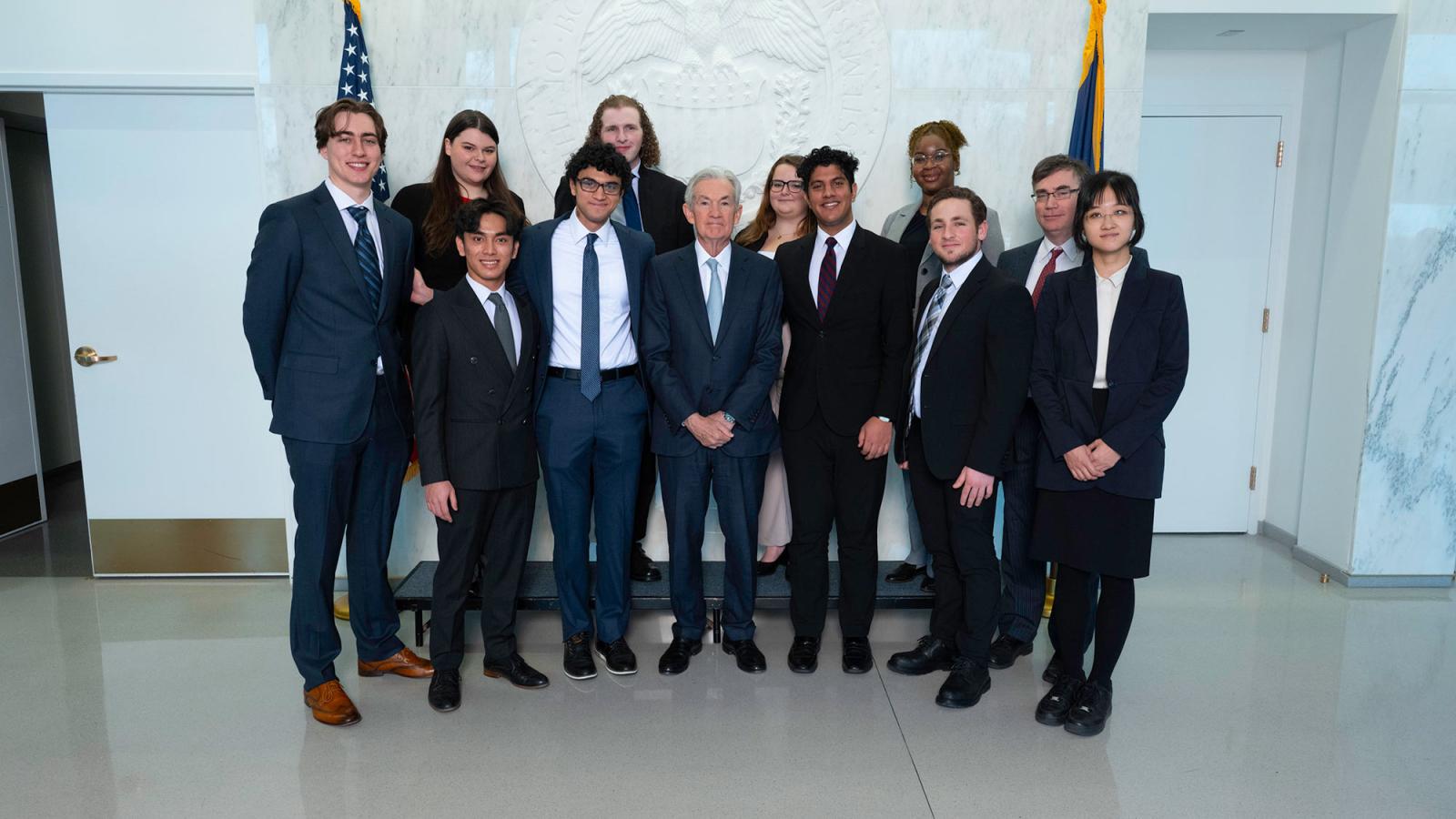
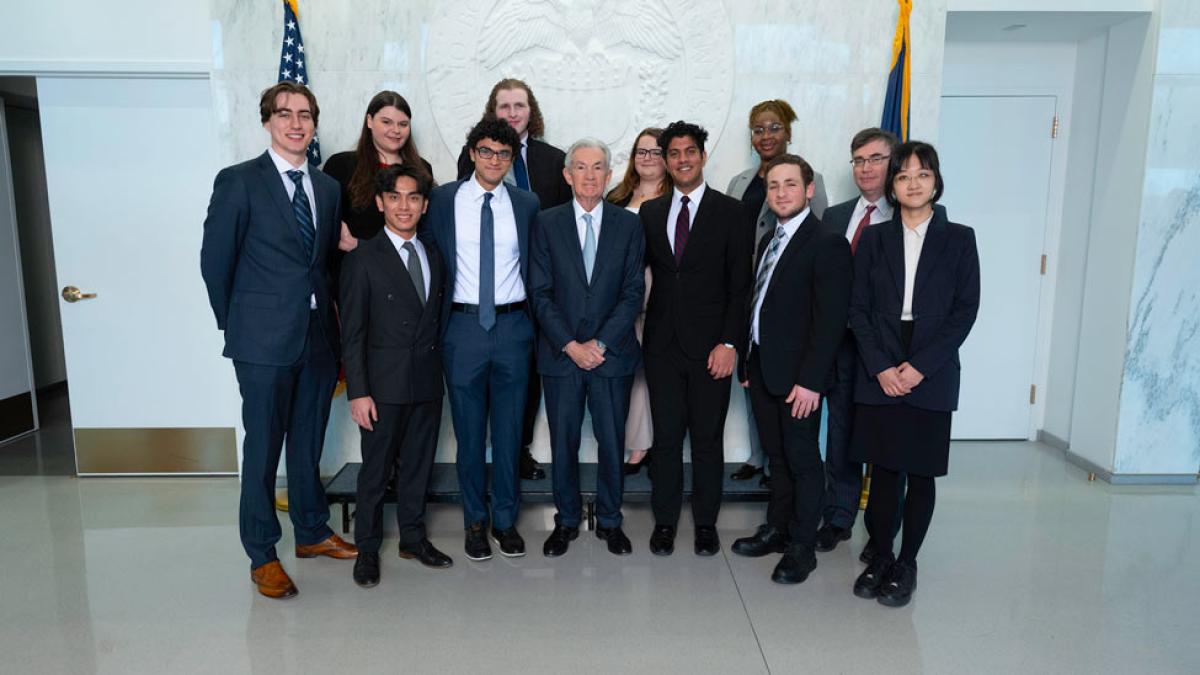
Machine Learning. It’s a buzzword of late, and for good reason. Effectively employing this type of artificial intelligence can help reveal otherwise unseen patterns in fields as diverse as weather forecasting, healthcare operations, and nearly everything in between.
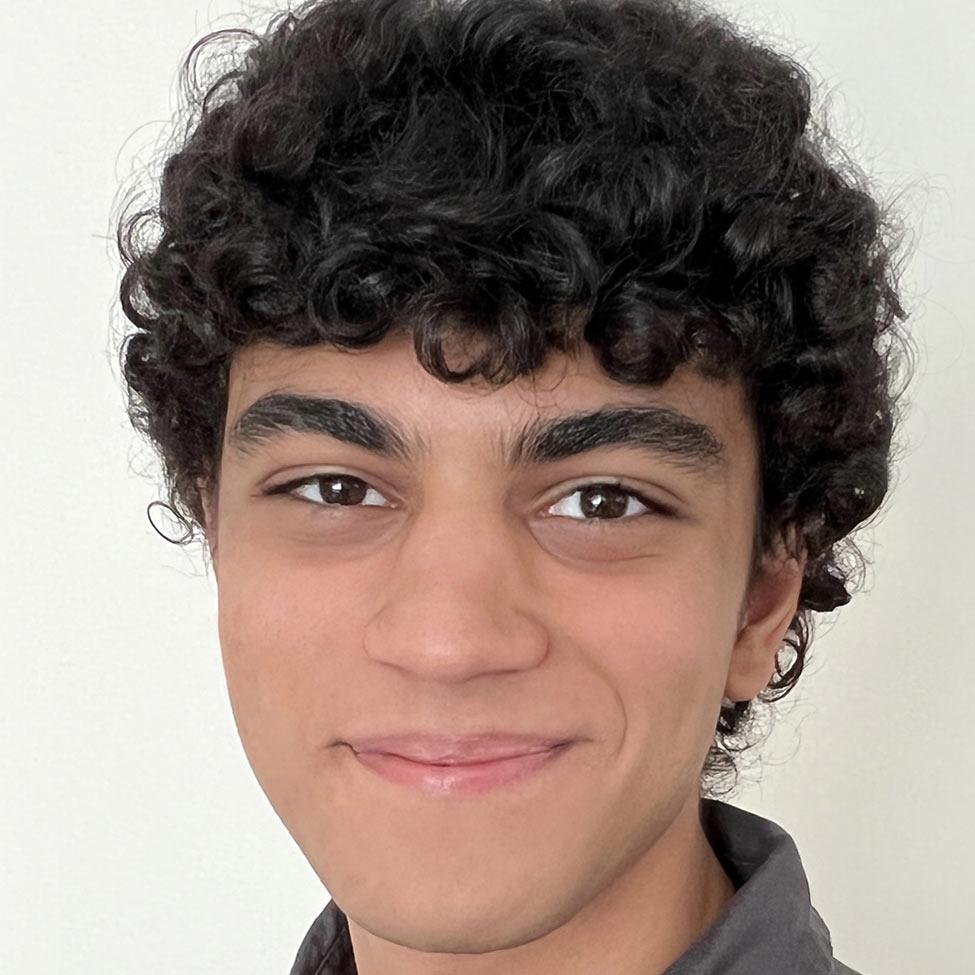
It’s becoming a big deal in economics, and the research of Dyson College student Liam Chentoufi ’25 exemplifies how when it comes to this sort of interdisciplinary learning, Pace is on the cutting edge.
Liam initially intended to major in business; until by happenstance, he attended a data-centric event hosted by the economics department during common hour. He cites this event as a huge turning point in his undergraduate career—which ultimately inspired him to change gears, and dive headfirst into the world of economics.
“Meeting the department and all of the professors has been transformative,” says Liam. “It’s those little chances that let us find our niche. I could’ve said to myself ‘I’ll just get lunch and go next year,’ but next year it might not have been the same.”
“It’s those little chances that let us find our niche. I could’ve said to myself ‘I’ll just get lunch and go next year,’ but next year it might not have been the same.”
As a sophomore, Liam took Economics 590: Data Analytics (R and Python), a graduate course taught by Professor Mary Kaltenberg, PhD, that merges economics principles with coding languages to make better use of data. As part of the class, Liam was tasked with a data analysis project.
“My original question was trying to test if there’s any relationship between the locations where the Federal Reserve gives their speeches and some economic variable. Professor Kaltenberg mentioned at one point that this data is really rich for machine learning because it’s textual, but I wouldn’t be able to do it for my 590 class because it was too long a project for a single semester.”
The seeds now planted for a more involved research study, Liam applied for and was accepted to the Office of the Provost’s Undergraduate Student Faculty Research program. With the mentorship of Professor Kaltenberg, he began to investigate how machine learning can be applied to better understand and predict future decisions from the Federal Reserve.
“The Fed, they conduct our nation’s monetary policy. When making their policy decisions they communicate with the public through these speeches that they publish every week or so. This project is trying to predict what they’re going to do at their next meeting based on what they’re saying in their speeches today,” he notes.
Each Federal Reserve speech is publicly available, so Liam’s research involves scraping the text, and building a machine learning model to glean the attitude that is expressed in the text. He’s currently experimenting with two different machine learning architectures; one, a simpler model that requires less computing power but has 60% accuracy in classifying the text. The second, a more complex model that requires computing power beyond his personal laptop, is an adaptation of a model called Roberta developed and honed by Google and Meta.
“[Roberta’s] a larger model that’s more complex, it’s harder for me to understand but it does yield more accurate results; it takes more time and computing power to train the model,” explains Liam.
Professor Kaltenberg, who has been advising Liam as to the types of machine learning tools and resources he can utilize and experiment with for the project, believes this research is very representative of where the field is going; and is proud of the fact that Pace is among one of the first institutions to explore this unique research question.
“Embedding machine learning within economics is increasingly important, and it’s one of the reasons why we created a new degree, computational economics,” says Kaltenberg. “Liam’s project is exactly a reflection of that trajectory within economics, and across many different industries. This particular topic, trying to predict what the Fed will do next, can be extremely lucrative. We are not the first to consider it, but we’re among the first.”
This particular topic, trying to predict what the Fed will do next, can be extremely lucrative. We are not the first to consider it, but we’re among the first.
The research dovetails very nicely with Liam’s future plans—this summer, he’s landed an internship with the Federal Reserve Bank of Boston, where he will further learn about the machinations of monetary policy. After the summer, he plans on deciding whether to pursue a graduate degree in economics or enter the workforce upon graduation in spring 2025.
Through this research, his strong academic achievement, and his interests outside the classroom—he is co-captain of Pace’s nationally recognized Federal Reserve Challenge team—Liam is setting himself up for future success no matter what route he takes. But perhaps most impressive, is the attitude he has developed in part through this research; one that has helped him develop into a more resilient individual, more confidently able to tackle whatever may be thrown is way.
“You’re learning and testing things on the fly, it’s taught me a lot about myself,” says Liam. “With coding, you can receive so many errors, which is head-bangingly frustrating. But when it works, it is euphoric.”
“That’s the biggest thing,” he adds. “Learning how to push through hard things.”
